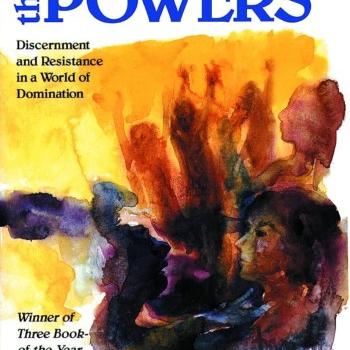Here is Valerie Tarico’s list of the “12 worst ideas religion has unleashed on the world.” And here is Kate Blanchard’s response, a list of “12 Essentialist Oversimplifications About Religion Badly in Need of Theory.”
Tarico and Blanchard certainly seem to disagree about the value of religion and its relationship to justice, but what’s more notable and interesting, I think, is all that they don’t disagree about. Despite some overly sweeping rhetoric in both pieces, and despite their apparently different starting points, Tarico and Blanchard seem to share very similar ideas about what constitutes Very Bad Stuff and, on the positive side, what we should regard as admirable and a Good Thing.
Eric Reitan chimes in with a helpful summary of why I find this perennial non-achievement of disagreement frustrating:
People can have all the same values and the same assessment of the facts and yet end up seeming as if they fundamentally disagree about religion — when really they’re just talking past each other. Joe Shmoe can hate all the things that Valerie Tarico hates, and they can (perhaps) love all the same things about Martin Luther King Jr. But they disagree vociferously about religion. Why? Because Ms. Tarico attributes the former things to religion (because religion is bad, and these are the things that make it bad), while attributing MLK’s virtues to humanism; but Mr. Shmoe attributes MLK’s virtues to religion (because religion is good, and these are the things that make it good), while attributing Ms. Tarico’s list of horrors to the general human propensity for tribalism and the like.
This is why I generally default to a Brenda Russell perspective: I don’t care how you get there, just get there if you can.
Pope Francis made waves a while back when he said something similar to this: “We must meet one another doing good. … Do good: we will meet one another there.”
Ah, you say, but what does it mean to “do good”? What is “good” and how can we know it when we see it? And how can we resolve disagreements when, for example, Francis says he’s “doing good” by banning contraception, while I say “doing good” would mean increasing access to it?
Those are all potentially fascinating and worthwhile questions. Deep stuff. A lifetime spent studying such questions, poring over Kant and Mill and Rawls and such can be, for some, a life well spent.
But I also respect the wisdom of Jesus’ skeptical responses to all those questions. He seemed to regard them as guilty unless proven innocent. Whenever someone asked him some variation of “Ah, but what is good?” — and the Gospels are full of people asking him questions like that — Jesus treated the question as an evasion. He seemed to assume that most people asking that question already mostly knew the answer. I suspect that’s right.
And I suspect that the more we do, in fact, “meet one another” doing the good that we mostly agree on, the more able we will be to resolve the inevitable disagreements and disputes that remain.
So, again, I’m with Brenda: I don’t care how you get there, just get there if you can.












